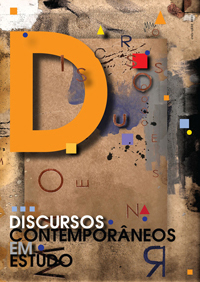Legislação e inclusão educacional à luz da ADC
DOI:
https://doi.org/10.26512/discursos.v1i1.0/8279Keywords:
Ideology. Discourse. Inclusion.Abstract
In this work, we analyze the Ideology present in some legal landmarks of the inclusive education and the discourse of some teachers about this perspective in Education. This work tries to understand the reasons of the resistance in the execution of the inclusive perspective. Thus being, when analyzing the present ideology in these legal texts is intended here to promote a reflection on the difficulties of the implantation of this proposal. This research is based on the qualitative methods and use the theories and the methods of analysis of the speech of Fairclough (2001 and 2003), as well as the theories on Ideology of Thompson (1995). These approaches interact and serve here as a support to understand the elaboration and the interpretation of the legal text that provides the foundations of the inclusive education.
Downloads
References
BRASIL. Constituição da República Federativa do Brasil de 1988. Disponível em <http://www.planalto.gov.br/ccivil_03/Constituicao/Constitui%C3%A7ao.htm>
ALTHUSSER, L. Aparelhos ideológicos de estado: notas sobre os aparelhos ideológicos de Estado. Rio de Janeiro: Geral, 1985.
BAKHTIN, M. Marxismo e filosofia da linguagem. São Paulo: Hucitec, 1999.
BAUER, M. & GASKELL, G. Pesquisa qualitativa com texto, imagem e som: um manual prático. Petrópolis: Vozes, 2002.
CHAUI, M. O que é Ideologia. São Paulo: Brasiliense, 2004.
CHOULIARAKI, L. & FAIRCLOUGH, N. Discourse in late modernity; Rethinking Crítical discourse analysis. Edinbourg: Edinbourg University Press, 1999.
VAN DIJK, T. Ideologia: una aproximacion multidisciplinaria. Barcelona: Gedisa, 1999.
EALGLETON, T. Ideologia. São Paulo: Boitempo, 1997.
FAIRCLOUGH, N. Discurso e mudança social. Brasília: Editora Universidade de Brasília, 2001.
FAIRCLOUGH, N. Language and globalization. New york: Perpetua, 2006.
FAIRCLOUGH, N. Analysing discourse: Textual analisys for social research. Routledge, London, 2003.
FAVERO, E. A. G. Direitos das pessoas com deficiência: garantia de igualdade na diversidade. Rio de Janeiro: WVA, 2004.
FLICK, U. Uma introdução à pesquisa qualitativa. Porto alegre: Bookman, 2004.
FOUCAULT, M. A ordem do discurso. São Paulo: Loyola, 2005.
MINISTERIO DA EDUCAÇÃO. Direito à educação: orientações gerais e marcos legais. Brasília, 2006.
ORLANDI, E. P. O que é lingüística. São Paulo: Braziliense, 2007.
PEDRO, E.R. Análise Crítica do Discurso: uma perspectiva sociopolítica e funcional. Lisboa: Caminho, 1997.
SILVA, M. F. (Orgs.). Educação Inclusiva: uma visão diferente. Editora da UFRN, 2004.
THOMPSON, J. B. Ideologia e cultura moderna: teoria social crítica na era dos meios de comunicação de massa. Petrópolis, Rio de Janeiro: Vozes, 1995.
VIEIRA, J. A. [et al]. Reflexões sobre a língua portuguesa: uma abordagem multimodal. Petrópolis, RJ: Vozes, 2007.
VIEIRA, J. A. [et al]. As abordagens críticas e não-Críticas em análise do discurso. In: Vieira, Josênia Antunes & SILVA, Denize Helena Garcia da. (Orgs.). Análise do discurso: percursos teóricos e metodológicos. Brasília: Plano, 2002.
WERNECK, C. Ninguém mais vai ser bonzinho na sociedade inclusiva. Rio de janeiro: WMA, 1997.
WODAK, R & MEYER, M. Métodos de análisis crítico del discurso. Barcelona: Gedisa, 2001.
WODAK, R. Do que trata a ADC ”“ Um resumo de sua história, conceitos importantes e seus desenvolvimentos. In Revista Linguagem em (Dis)curso. V.4, Santa Catarina: UNISUL, 2004.
Downloads
How to Cite
Issue
Section
License
Autores que publicam nesta revista concordam com os seguintes termos:
a) Os(as) autores(as) mantêm os direitos autorais e concedem à revista o direito de primeira publicação, sendo o trabalho simultaneamente licenciado sob a Creative Commons Attribution License o que permite o compartilhamento do trabalho com reconhecimento da autoria do trabalho e publicação inicial nesta revista.
b) Os(as) autores(as) têm autorização para assumir contratos adicionais separadamente, para distribuição não-exclusiva da versão do trabalho publicada nesta revista (ex.: publicar em repositório institucional ou como capítulo de livro), com reconhecimento de autoria e publicação inicial nesta revista.
c) Autores têm permissão e são estimulados a publicar e distribuir seu trabalho on-line (ex.: em repositórios institucionais ou na sua página pessoal) após o processo editorial, já que isso pode gerar alterações produtivas, bem como aumentar o impacto e a citação do trabalho publicado (Veja O Efeito do Acesso Livre).
d) Os(as) autores(as) dos trabalhos aprovados autorizam a revista a, após a publicação, ceder seu conteúdo para reprodução em indexadores de conteúdo, bibliotecas virtuais e similares.
e) Os(as) autores(as) assumem que os textos submetidos à publicação são de sua criação original, responsabilizando-se inteiramente por seu conteúdo em caso de eventual impugnação por parte de terceiros.




